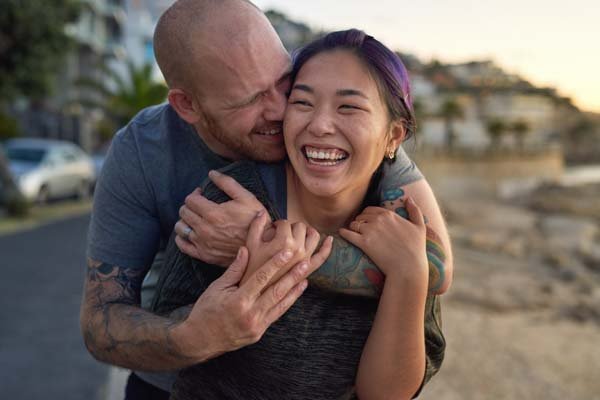In the heart of every relationship lies the potential for deep connection and intimacy, but also the risk of conflict and disconnection. One of the most profound challenges couples face is navigating the instinctual survival responses that are hardwired into our brains: fight, flight, freeze, and fawn. These responses, while useful in life-threatening situations, can wreak havoc in our relationships. Couples counseling offers a collaborative space where partners can learn to team up against these primal responses, fostering healthier and more resilient connections.
Understanding the Survival Responses
Before diving into how couples counseling can help, it’s essential to understand the survival responses:
Fight: This response manifests as aggression, argumentativeness, or a need to dominate. When triggered, a partner may become verbally or physically confrontational.
Flight: This involves withdrawing or escaping from the situation. A partner may leave the room, avoid difficult conversations, or emotionally distance themselves.
Freeze: In this state, a person may feel stuck, unable to respond or make decisions. They might become silent, detached, or non-responsive.
Fawn: This response involves excessive people-pleasing or placating behaviors. A partner may agree to things they don’t want to avoid conflict or to gain approval.
While these responses are natural and serve a purpose in protecting us from harm, they are often counterproductive in the context of a romantic relationship. When triggered by everyday conflicts or stressors, they can lead to patterns of behavior that undermine trust, intimacy, and effective communication.
The Role of Couples Counseling
Couples counseling provides a safe and structured environment where partners can explore and understand their survival responses. The process is collaborative, with the counselor acting as a facilitator to help both partners recognize and address these automatic reactions. Here’s how it works:
Creating a Safe Space
The first step in couples counseling is creating a safe and non-judgmental space where both partners feel heard and understood. This environment allows them to lower their defenses and engage in open and honest communication. The counselor helps set ground rules for respectful interaction, ensuring that each partner can express themselves without fear of criticism or retaliation.
Increasing Awareness
A critical component of couples counseling is increasing awareness of the fight, flight, freeze, and fawn responses. The counselor helps each partner identify their typical reactions and understand the underlying triggers. By recognizing these patterns, couples can begin to see how their survival responses are impacting their relationship.
Developing Emotional Regulation Skills
Emotional regulation is key to managing survival responses. Couples counseling focuses on teaching partners techniques to regulate their emotions in the heat of the moment. These techniques might include mindfulness practices, deep breathing exercises, and grounding strategies. By learning to stay calm and centered, partners can respond more thoughtfully rather than reacting impulsively.
Enhancing Communication
Effective communication is the cornerstone of a healthy relationship. Couples counseling helps partners develop skills for expressing their needs, feelings, and concerns in a constructive manner. This includes learning to listen actively, validate each other’s experiences, and use “I” statements to take ownership of their emotions. Improved communication reduces misunderstandings and fosters a deeper emotional connection.
Building Empathy and Understanding
Empathy is the ability to understand and share the feelings of another. In couples counseling, partners are encouraged to put themselves in each other’s shoes and see the situation from their partner’s perspective. This practice builds compassion and reduces the likelihood of judgmental or defensive reactions. When partners feel understood and supported, they are more likely to work together to resolve conflicts.
Developing Collaborative Problem-Solving Skills
Couples counseling emphasizes collaborative problem-solving. Instead of viewing each other as adversaries, partners are encouraged to see themselves as a team working towards common goals. The counselor guides them in developing strategies for resolving conflicts and making decisions together. This collaborative approach strengthens the partnership and promotes a sense of unity.
Practical Strategies for Overcoming Survival Responses
Time-Outs: When emotions run high, taking a time-out can prevent escalation. Couples can agree on a signal or phrase that indicates the need for a break. During this time, each partner can practice self-soothing techniques before reconvening to discuss the issue calmly.
Check-Ins: Regular check-ins provide an opportunity for partners to share their feelings and concerns before they escalate. Setting aside time each week for a check-in can help prevent small issues from becoming major conflicts.
Repair Attempts: Making repair attempts after a conflict is crucial for maintaining connection. This might involve apologizing, offering a gesture of kindness, or expressing a desire to understand and resolve the issue. Successful repair attempts can mitigate the negative impact of survival responses.
Creating Rituals of Connection: Establishing rituals of connection, such as regular date nights or daily moments of affection, can strengthen the bond between partners. These rituals create positive experiences that counterbalance the stress and conflict in the relationship.
Couples counseling is a powerful tool for helping partners team up against the fight, flight, freeze, and fawn responses. By working collaboratively with a skilled counselor, couples can develop the awareness, skills, and strategies needed to navigate conflicts and stressors more effectively. The process fosters a deeper understanding of each other, enhances emotional regulation, and promotes healthier communication.
Ultimately, couples counseling helps partners transform their relationship into a resilient and supportive partnership. By embracing the collaborative nature of the counseling process, couples can learn to manage their survival responses and create a connection that is strong, compassionate, and enduring.
In the words of Esther Perel, “Love rests on two pillars: surrender and autonomy. Our need for togetherness exists alongside our need for separateness.” Couples counseling helps partners balance these needs, enabling them to thrive both as individuals and as a couple. By teaming up against their survival responses, couples can build a relationship that not only survives but flourishes.
If you need a trained and experienced therapist to help you sort out a really stuck spot in your relationship and are in the Minneapolis area, I can help. If you are looking for video visits, that is an option if you are anywhere in Minnesota. If you want to know more about dynamics in relationships, look at my Marriage Counseling page. If you are in Minnesota, I can help in person or on video. Contact me by phone: 612-230-7171 or email through my contact page. Or you can click on the button below and self-schedule a time to talk by phone or video.



